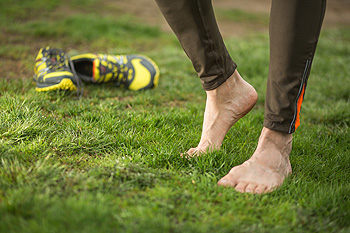Barefoot Running vs Running with Shoes
Monday, 21 January 2019 00:00 Barefoot running has become a trend in recent years. Many runners feel that they benefit from going shoeless and that shoes impede on their natural state. So what are the actual differences between running barefoot and running with shoes on? One of the main differences is how your foot hits the ground. Runners’ shoes usually hit the ground with their heels first, which creates a force up to three times the body’s weight. This amount of force can lead to certain injuries; two examples of these injuries are Achilles tendinitis and stress fractures. Barefoot runners strike the ground with the balls of their feet, which results in less force upon impact. Also, barefoot runners naturally shorten their strides, therefore reducing the force on their lower bodies. This reduced force automatically flexes joints, which creates a softer landing on hard surfaces. Shoes offer support that has made the muscles in feet move differently, because they don’t have to work as hard. Without shoes, your calves and feet will have to work harder to accommodate for the change in landing and your stride, but your body will be more attuned to your natural stride. If you are thinking about going barefoot while running, it is recommended that you consult a podiatrist first, especially if you have a history of foot problems.
Barefoot running has become a trend in recent years. Many runners feel that they benefit from going shoeless and that shoes impede on their natural state. So what are the actual differences between running barefoot and running with shoes on? One of the main differences is how your foot hits the ground. Runners’ shoes usually hit the ground with their heels first, which creates a force up to three times the body’s weight. This amount of force can lead to certain injuries; two examples of these injuries are Achilles tendinitis and stress fractures. Barefoot runners strike the ground with the balls of their feet, which results in less force upon impact. Also, barefoot runners naturally shorten their strides, therefore reducing the force on their lower bodies. This reduced force automatically flexes joints, which creates a softer landing on hard surfaces. Shoes offer support that has made the muscles in feet move differently, because they don’t have to work as hard. Without shoes, your calves and feet will have to work harder to accommodate for the change in landing and your stride, but your body will be more attuned to your natural stride. If you are thinking about going barefoot while running, it is recommended that you consult a podiatrist first, especially if you have a history of foot problems.
Barefoot Running
Many people have decided to start barefoot running for a variety of reasons. Some claim that the technique improves foot biomechanics while also reducing injury risk. If you are interested in running barefoot, consult with Dr. Frederick Quirante from Texas. Our doctor will assess your condition and provide you with quality advice and whether barefoot running is right for you.
Running Barefoot vs. Running in Shoes
While running shoes provide excellent support and protection to our feet, they can negatively impact the way we run. Those who run in shoes have been found to be more likely hit the ground with their heels first. This running style has been found to increase the risk of injury from ankle sprains, stress fractures, and Achilles tendinitis. Those who run barefoot tend to land on the balls of their feet which generates less impact.
Benefits of Running Barefoot
Some reported benefits of running barefoot include:
- Less impact on the feet
- Increased sensation and feedback from the feet
- Increased efficiency from less weight from shoes
- Potential for less injury from footwear
- Reported increases in strength to foot and leg muscles
- Developing a natural gait
- Improving balance and proprioception
Downsides to Running Barefoot
- Less protection from debris on the ground
- Increased risk of contracting bacterial or fungal infection
- Potential for injuries from overuse
- Blisters
Those with diabetes should avoid barefoot running at all costs. This is due to the risk of sustaining a wound that could become infected. If you do decide to run barefoot, inspect the area you are running in for lots of debris. Furthermore, it is best to start off slow and to not push yourself too hard the first time out, even if you run in shoes regularly. Another substitute for running shoes are minimalist shoes which reduce the weight of shoes but provide better protection.
If you have any questions, please feel free to contact our office located in Nederland, TX. We offer the newest diagnostic and treatment technologies for all your foot care needs.
Read more about Why Many Are Making the Switch to Barefoot Running





